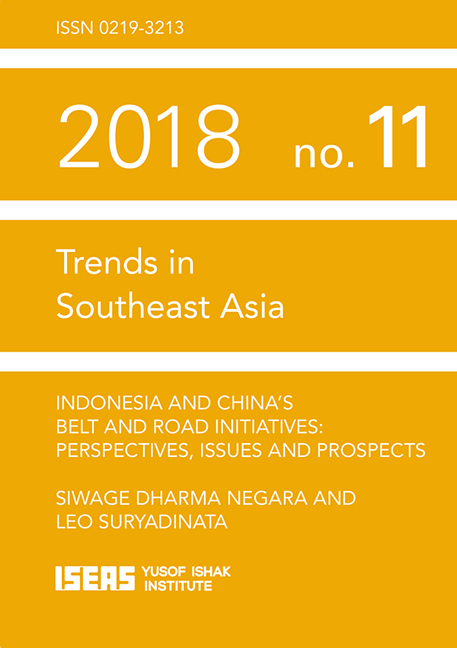Indonesia and China's Belt and Road Initiatives: Perspectives, Issues and Prospects
Published online by Cambridge University Press: 12 February 2019
Summary
INTRODUCTION
The Belt and Road Initiative (BRI) was first introduced by Chinese President Xi Jinping in October 2013. Initially, the proposal offers cooperation in infrastructure development covering the overland “Silk Road Economic Belt” and the sea-based “Maritime Silk Road”. Later the proposal has been extended to also cover non-infrastructure investment, including cultural ties and people-to-people exchanges. In recent years, BRI has become China's global banner for promoting its international position as the leader of open economic cooperation.
For developing countries that are keen to accelerate their economic development, BRI is seen as an opportunity to tap into China's huge financial resources and technological capability. Specifically, for Indonesia, a country that is currently embarking on massive infrastructure development, BRI is considered a good alternative financing source. In fact, Indonesian President Joko “Jokowi” Widodo, was among the seven heads of state from ASEAN to attend the inaugural BRI Forum in May 2017. Jokowi mentioned then that he wanted to see how Indonesia could benefit from BRI cooperation, and after the BRI forum, Indonesia proposed a list of projects for cooperation under BRI.
Despite this interest to participate in BRI, however, there is as yet no concrete BRI project agreed to between China and Indonesia. Also, both countries have different perceptions on what BRI projects are. While China considers all projects, including infrastructure projects and economic interactions as BRI projects, Indonesia only sees infrastructure projects started during the Xi Jinping period to be such. Since China perceives BRI cooperation as a totality of China–Indonesia economic interactions, this paper's discussion also touches on China's trade, investments, loans and tourism in/with Indonesia in order to provide a more complete picture.
While there have been a large number of analyses with regard to BRI, including its potential geopolitics and geostrategic impacts on countries along the belt route, there is not much analysis regarding how the countries in the maritime silk route perceive BRI. This paper aims to fill this gap by examining how different stakeholders (state, business, media and society) perceive BRI. It explains Indonesia's key interests in BRI cooperation, describes the proposals from Indonesia, and assesses how BRI cooperation will affect relations between the two countries.
- Type
- Chapter
- Information
- Indonesia and China's Belt and Road Initiatives , pp. 1 - 41Publisher: ISEAS–Yusof Ishak InstitutePrint publication year: 2018

